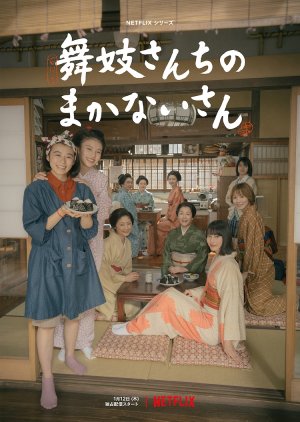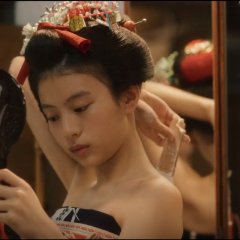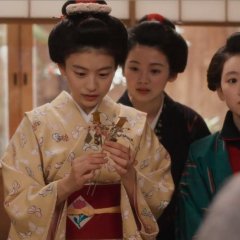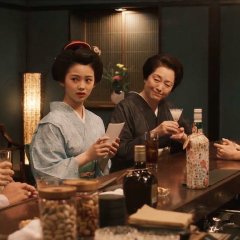Due amiche inseparabili si trasferiscono a Kyoto per inseguire il sogno di diventare maiko, ma decidono di coltivare passioni diverse pur vivendo sotto lo stesso tetto. (Fonte: Netflix) Modifica la Traduzione
- Italiano
- 中文(台灣)
- Arabic
- Русский
- Titolo Originale: 舞妓さんちのまかないさん
- Conosciuto Anche Come: Kiyo in Kyoto , Maiko-san Chi no Makanai-san
- Sceneggiatore & Regista: Koreeda Hirokazu, Sato Takuma, Tsuno Megumi, Okuyama Hiroshi
- Generi: Cibo, Commedia, Vita
Dove Guardare Makanai
Subscription (sub)
Cast & Ringraziamenti
- Mori NanaNozuki KiyoRuolo Principale
- Deguchi NatsukiHerai SumireRuolo Principale
- Makita AjuRyokoRuolo di Supporto
- Hashimoto AiMomokoRuolo di Supporto
- Matsuoka MayuYoshinoRuolo di Supporto
- Matsuzaka KeikoChiyoRuolo di Supporto
Recensioni

Questa recensione può contenere spoiler
Be 100% you, wherever you are
The Makanai is a delightful and heartwarming coming of age drama about two teenagers who travel to Kyoto to train to become Maiko. The friendships and supportive atmosphere of the yakata will welcome you in and delight you with beauty and delicious food.Close friends Kiyo and Sumire enter the world of the maiko at the age of sixteen. Sumire is a natural but Kiyo is not and is expelled. Fate as it does, plays a hand when the older cook of the house hurts her back and Kiyo steps in with her lovingly prepared meals and becomes the new makanai, fixing all the meals for the women. That is pretty much the whole plot, the story follows the two over the next year as they blossom and find their way in the world all while maintaining their friendship.
The drama does cover the lives of the “Mothers” who run the yakata and also the star geiko, Momoko. The women are supportive of each other as they face life choices, some choosing to stay and others to go. Answers to conflicts arrive as easily and gently as on a breeze. There is no hazing or jealousy, only a little friendly competitiveness and teasing. This is a glimpse behind the scenes and into the world of the maiko and those training to be one. Because one cannot be a married maiko or geiko, as the young women age, they are faced with leaving their art if they choose to marry.
More than focusing exclusively on the maiko tradition, the friendship is the heart of the drama. Kiyo and Sumire have a sismance that will inspire you. The young women are always happy, never depressed or sad living away from home. Everyone does their chores and lessons with a joyful attitude. It may not be entirely realistic but it does make for soothing viewing. The cooking and food prep is tantalizingly shot with great care. Be advised you may not want to watch this on an empty stomach as Kiyo’s dishes do look delicious!
Though the action is languorous, the scenes tend to be vibrant with conversations going on in both the fore and background. Laughter often fills the air in the cozy house. The acting is natural and approachable. This slice of life is an example of life being lived in the details.
With the exception of a boisterous and attention seeking geiko who returns after a failed marriage I found most of the main characters charming. The other exception to my enjoyment of this drama was a mai developed on Night of the Living Dead for a festival. But that’s my personal issue-I’m terrified of zombies even when portrayed by stunning maiko!
In a world that can be cold, this drama wraps you in its warm embrace and feeds you comfort food, giving you hope that your dreams can come true and that friendship can be for a lifetime.
1/14/23
Questa recensione ti è stata utile?

The lives of Maikos and Geikos have often been represented by external gazes, and they were done wrong many times by international eyes who saw in them what they wanted to see rather than what was there. This drama has the ability to showcase a traditional practice in a day-to-day setting, letting us see the domesticity, the relatable bits, the inner story of a Maiko house.
This is less about painting a grandiose image and more about showcasing daily lives, with the core of the story being two friends from Aomori (Kiyo and Sumire) who decide to move at age 16 to become Maiko. However, and very early on, Kiyo finds herself in a different journey, the one that gives the title to the drama: she discovers the role of a Makanai, a cook who prepares home-made meals for those who work in the house (and maybe also, through that, provides unconditional love and support).
With a masterful grace similar to dramas like Kinou Nani Tabeta? and Shinya Shokudo (and, less successfully, others like Lunch no Akko-chan or Ando Natsu), this drama is successful in writing the complex through simplicity and narrate a compelling story (in this case, a coming of age story) in a setting that is inviting, welcoming and that has inspiring cooking scenes.
The relationship in the center is the friendship between Kiyo and Sumire, which is incredibly refreshing to see. I'm very thankful for dramas that have come out of late which allow for more than just romance in its core. Still, there are a lot of characters with their own journeys (successful Geikos with life crisis, retired ones who deal with balancing their blood family and their work family, old apprentices who struggle, new apprentices who also do, retired Geikos who come back, family members of people in the house who don't share the traditions, etc.).
The only critique I'd give is that some elements of narrative tension, some thing that seemed would go somewhere, didn't quite have the space to develop. I can only hope that this is like Shinya Shokudo and we get more of it, but only time and people's engagement will tell.
If you're looking for a fast-paced, action-packed, tragedy-filled drama, this one isn't it. But if you're looking for a relaxing, domestic, coming-of-age drama with traditional elements and amazing food, a drama that you can come home to, then give this one a chance.
Questa recensione ti è stata utile?















 1
1










































